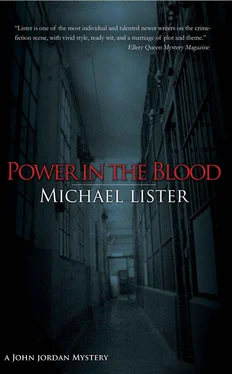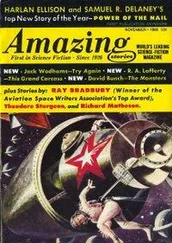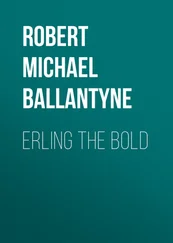Michael Lister - Power in the Blood
Здесь есть возможность читать онлайн «Michael Lister - Power in the Blood» весь текст электронной книги совершенно бесплатно (целиком полную версию без сокращений). В некоторых случаях можно слушать аудио, скачать через торрент в формате fb2 и присутствует краткое содержание. Год выпуска: 2010, Издательство: Pulpwood Press, Жанр: Триллер, на английском языке. Описание произведения, (предисловие) а так же отзывы посетителей доступны на портале библиотеки ЛибКат.
- Название:Power in the Blood
- Автор:
- Издательство:Pulpwood Press
- Жанр:
- Год:2010
- ISBN:нет данных
- Рейтинг книги:4 / 5. Голосов: 1
-
Избранное:Добавить в избранное
- Отзывы:
-
Ваша оценка:
- 80
- 1
- 2
- 3
- 4
- 5
Power in the Blood: краткое содержание, описание и аннотация
Предлагаем к чтению аннотацию, описание, краткое содержание или предисловие (зависит от того, что написал сам автор книги «Power in the Blood»). Если вы не нашли необходимую информацию о книге — напишите в комментариях, мы постараемся отыскать её.
Power in the Blood — читать онлайн бесплатно полную книгу (весь текст) целиком
Ниже представлен текст книги, разбитый по страницам. Система сохранения места последней прочитанной страницы, позволяет с удобством читать онлайн бесплатно книгу «Power in the Blood», без необходимости каждый раз заново искать на чём Вы остановились. Поставьте закладку, и сможете в любой момент перейти на страницу, на которой закончили чтение.
Интервал:
Закладка:
I knelt down on one knee by the river and quietly began to cry. I was crying for Molly, a good woman who had loved her husband. I was crying for Anthony, who went to prison on a marijuana possession and came out a crack addict prostitute in a body bag. I also cried for me. I was a total stranger in a place I once called home. I had never fit in like Jake-my neck had never been that red-but now I was totally alienated.
The isolation was painful.
When I finished crying, I got up and walked over to where the car now sat on dry land. Molly’s wet auburn hair was matted, and it hung forward with the rest of her slumping body that only the seat belt held vertical. The officers and ME had opened her door maybe ten minutes ago. Water was still draining onto the ground. The hair covered her face, and for that I was glad.
There was a strong odor coming from the car, but it wasn’t Molly, not yet anyway. It was the mix of the river water, including the things that are in it, and the interior of the car. I smelled fish and mildew.
I walked around to the back of the car and studied the bumper. It was bent slightly, but there was no way to know when it had happened. There were a few dents and some white paint from another vehicle on the back right quarter panel. The paint could have been on the car for six months or six hours; there was absolutely no way to know. But I knew. This was the work of Matt Skipper. Molly had lost the love of her life. Having nothing else to lose, with the exception of her own life, she was very dangerous to Skipper. He no longer had power over her, because he no longer had total power over her husband.
I walked back up the hill, picturing in my mind how the deed was done. This time I didn’t stop where the officers stood, but continued to where I thought Skipper would have tried to stop. I found tire marks on the road, not acceleration marks, but the skid marks of Molly’s car as she tried to stop. I pictured Skipper hitting her one last time knocking her unconscious, sending her car down the hill and into the river. A second tire track was visible on the edge of the road in the dirt.
The tire track could just be seen beneath the highway patrol car that was parked on top of it, whose front tires had already ridden over it. It came as no surprise to me that the highway patrolman was one of Skipper’s biggest hunting buddies. I didn’t see any point in mentioning what I had discovered . . .
Or in any longer seeking justice in the manner I had been.
Chapter 43
The Quarters, the name given to the black section of town by a certain segment of the white population, was roughly two hundred acres on the south side of Pottersville, only part of which was inside the city limits. A single row of small, red-brick duplexes provided by the government for low-income housing was the only part of black Pottersville actually located within Pottersville.
The low-income housing, known as the black projects, was a mirror image of the government housing on the east side of town, known as the white projects. The only difference in the two projects was color. Thus, it was more of a negative than a mirror-the negative of a hateful and ugly picture of humanity.
I drove past the row of identical duplexes and found myself again surprised by how widely the yards varied. In front of most of the dwellings, the yards were barren, a mixture of dirt, weeds, and trash. Others, however, had neatly trimmed lawns and a shrub or two. Most of the houses did not have vehicles in front of them. Of those that did, many were tireless heaps up on blocks and covered with plastic tarps. Two of the units had late-model Cadillacs that gleamed even under the late evening sun.
Beyond the projects were the houses and trailers of African Americans who could afford to own their own homes. These dwellings were as eclectic as any in the world. White prosperity and poverty in the rural South were separated from each other-relegated to certain well-defined clumps and clusters. However, black prosperity was scattered like leaven within the lump of black poverty. To my left stood a nice brick home with a paved driveway, two-car garage with the door closed, and a large yard in which a flashy bass boat sat on its trailer. To my right an old, faded single-wide trailer with its insulation hanging loosely underneath sat unevenly on cinder blocks with at least six dogs lying on the bare dirt yard scratching and licking themselves.
On the corner, a small fire burned surrounded by three men and a woman-all holding tall beer cans in their hands. Across the road and down two yards, at least twenty children were playing various games under the watchful eye of an elderly, gray-haired lady rocking on the front porch. Occasionally, she leaned forward and spat her snuff-filled spittle onto the front yard.
A little farther down, I passed a small travel trailer that served as home for three adults and four children-a digital direct TV satellite dish mounted to its upper right-hand side. Next to it a twenty-three hundred square-foot home stood as it had for the nearly twenty years it had been occupied with no brick or wood on its exterior- only faded gray sheets of once-silver Thermo-Ply. The modest, freshly painted clapboard house with the manicured yard next to it was Uncle Tyrone’s.
When I arrived at Uncle Tyrone’s house, his numerous children sitting on his front porch told me that Merrill and Tyrone were already at his shop. Uncle Tyrone owned a shoe shop just over the tracks in Pottersville. This meant that although he lived on the wrong side of the tracks, Tyrone owned his own business on the right side of the tracks. His was one of only four black-owned businesses in Pottersville and the only one that was located in the white part of Pottersville.
He wasn’t very far across the tracks, but it was far enough to suit him and close enough to the tracks to suit the white establishment. I had heard some of that white establishment refer to him as a “white negra.” No one had ever said anything like that to me, because they knew what I was-what I had been labeled since the eighth grade when I had fallen in love with Merrill’s little sister, Kyria-a nigger lover.
“Cousin John,” Tyrone said as I walked in, giving me his usual greeting, “how are you?”
“I’m okay, Uncle Tyrone. How are you?”
“I’m hangin’ tough, but you, you don’t look okay. You tryin’ to become black the hard way,” he said, laughing. Merrill and I laughed, too. “You ought to just have the opposite of that treatment Michael Jackson’s having. Be a lot less painful.”
“I’ll keep that in mind,” I said. “Thank you. You sure know a lot about Michael Jackson to be an old man.”
“I watch a lot of BET. And, what they forget to tell me I read in Jet .” We all laughed some more. “So, let me see your tape, son.” I reached into my pocket to retrieve the tape. “Is it standard eight millimeter or high eight?”
“Standard,” I said as I handed him the tape.
“Ah, yeah, I can handle this. Right back here,” he said as he began to walk through the faded curtain behind his counter.
In the back of Tyrone’s store was an office roughly the size of my trailer. It was filled with shelves, which were filled with shoe boxes. On a table that stood against the right wall, there were all sorts of electronic equipment-VCRs, TVs, and stereo components. The eight-millimeter VCR sat on top of a small, square monitor in the center of the table.
“You the only white man who come in here,” he said, smiling broadly. “Any other one see all this stuff think I stole it for sure.” We all laughed, though it was more true than funny.
He popped the tape in.
“I have no idea what’s on the tape. Would you mind if Merrill and I previewed it alone?”
Читать дальшеИнтервал:
Закладка:
Похожие книги на «Power in the Blood»
Представляем Вашему вниманию похожие книги на «Power in the Blood» списком для выбора. Мы отобрали схожую по названию и смыслу литературу в надежде предоставить читателям больше вариантов отыскать новые, интересные, ещё непрочитанные произведения.
Обсуждение, отзывы о книге «Power in the Blood» и просто собственные мнения читателей. Оставьте ваши комментарии, напишите, что Вы думаете о произведении, его смысле или главных героях. Укажите что конкретно понравилось, а что нет, и почему Вы так считаете.












